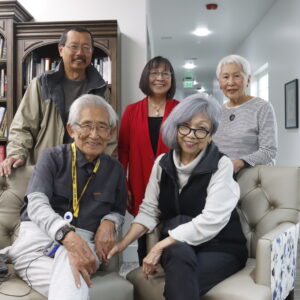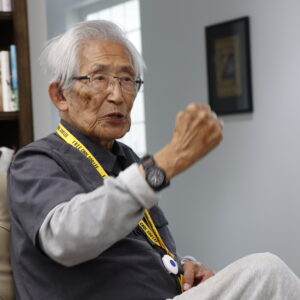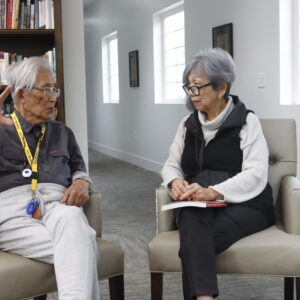 ACC Care Center has been recognized as a Best Nursing Home for 2025 by U.S. News & World Report. ACC Care Center has received recognition for both Short-term and Long-term Care and is one of only 3 Sacramento Skilled Nursing communities to receive dual recognition.
ACC Care Center has been recognized as a Best Nursing Home for 2025 by U.S. News & World Report. ACC Care Center has received recognition for both Short-term and Long-term Care and is one of only 3 Sacramento Skilled Nursing communities to receive dual recognition.
Since 2009, U.S. News’ annual Best Nursing Homes ratings have assisted American families in need of either short-term rehabilitation or long-term care for themselves or a loved one.
ACC Care Center earned its U.S. News Best Nursing Home status by achieving a rating of “High Performing,” the highest possible rating, for Short-Term Rehabilitation and Long-Term Care. U.S. News gives the designation of Best Nursing Home only to those that satisfy U.S. News’ proprietary assessment of consistent performance in quality measures.
 Heidi Wheeler LNHA, RCFE, LVN, ACC Care Center Administrator:
Heidi Wheeler LNHA, RCFE, LVN, ACC Care Center Administrator:
“I’m honored and immensely proud of the caring team at ACC Care Center for earning top honors in this thorough national review of nursing home quality. ACC Care Center has a robust training program that focuses on our mission to provide compassionate, person-centered care that celebrates our cultural diversity and promotes the highest quality of care to our residents in a homelike environment. With higher nurse to resident ratios our nursing team can spend more time with residents providing them with attentive, genuine care. Having more staff on hand and our Medical Director onsite regularly allows the team to be proactive vs reactive which results in better outcomes and fewer visits to the emergency room.”
 Dr. Scott Stringer MD, Sutter Physician and Medical Director of ACC Care Center:
Dr. Scott Stringer MD, Sutter Physician and Medical Director of ACC Care Center:
“As the Medical Director, I am incredibly proud of our commitment to providing the highest quality of care, reflected in the prestigious recognition from U.S. News & World Report. A cornerstone of our success is the thoughtful and strategic reduction in the use of antipsychotic medications. By prioritizing individualized care plans, promoting non-pharmacologic interventions, and fostering a deep understanding of behavioral health needs, we have significantly enhanced the well-being and safety of our residents. This achievement underscores our dedication to innovation, compassion, and setting a benchmark for excellence in skilled nursing care.”
 Connie L. Rusynyk, President and CEO of ACC Senior Services:
Connie L. Rusynyk, President and CEO of ACC Senior Services:
“I have worked in hundreds of Nursing Homes throughout my career, and the Care Center is one that is remarkable. What makes the Care Center so different? The community, the staff and the families involved make the Care Center such a special place for our elderly to call home! The community involvement is unlike anything that I have ever seen. The families are so actively involved with the Care Center, whether they have family or friends living in the Care Center or not. Our medical director, Dr. Scott Stringer, not only takes excellent care of each resident, but Dr. Stringer cares deeply about residents, families, and staff. I am proud of the work we do at the Care Center and the team of dedicated healthcare professionals that take such extraordinary care of our most fragile members of our community!”
For the 2025 edition, U.S. News evaluated nearly 15,000 nursing homes on patient and resident outcomes, such as infection rates; staffing levels; potentially inappropriate reliance on antipsychotic drugs; health inspection results and other indicators of quality.
“U.S. News’ Best Nursing Homes ratings put patient well-being at the forefront and provide families with the objective information they need to make confident decisions about their loved ones’ care,” said Ben Harder, chief of health analysis and managing editor at U.S. News. “These annual ratings recognize U.S. nursing homes that deliver high-quality care, earning consistent positive outcomes, and support American families in finding local nursing homes that prioritize safety and wellbeing.”
To calculate the Best Nursing Homes ratings, U.S. News evaluated each nursing home’s performance using a variety of quality measures obtained from the Centers for Medicare & Medicaid Services (CMS). The U.S. News methodology factors data such as resident care, safety and outcomes. Both short- and long-term ratings include data on nurse staffing, use of antipsychotic drugs and success in preventing ER and hospital visits. The long-term care rating also includes measures of whether a home changed ownership and how well it was staffed on weekends.
For more information, visit USNews.com and explore #BestNursingHomes on Facebook, Instagram, TikTok and X.

ACC Care Center
Skilled Nursing and Short-Term Rehabilitation
7801 Rush River Dr, Sacramento, CA 95831
accsv.org
About ACC Senior Services
For over 50-years, ACC Senior Services (formerly known as The Asian Community Center of Sacramento Valley) has been dedicated to enriching the lives of older adults and family caregivers.
We promote the general welfare and enhance the quality of life of our community by offering specially designed, culturally sensitive services, programs and classes for older adults in the Sacramento region.
ACC offers a full continuum of supportive services from Home and Community-Based Programs to our Residential Living and Care Communities.
ACC Senior Services is a not-for-profit 501(c)3 tax-exempt organization.
About U.S. News & World Report
U.S. News & World Report is the global leader for journalism that empowers consumers, citizens, business leaders and policy officials to make confident decisions in all aspects of their lives and communities. A multifaceted media company, U.S. News provides unbiased rankings, independent reporting and analysis, and consumer advice to millions of people on USNews.com each month. A pillar in Washington for more than 90 years, U.S. News is the trusted home for in-depth and exclusive insights on education, health, politics, the economy, personal finance, travel, automobiles, real estate, careers and consumer products and services.



 ACC Care Center has been recognized as a Best Nursing Home for 2025 by U.S. News & World Report. ACC Care Center has received recognition for both Short-term and Long-term Care and is one of only 3 Sacramento Skilled Nursing communities to receive dual recognition.
ACC Care Center has been recognized as a Best Nursing Home for 2025 by U.S. News & World Report. ACC Care Center has received recognition for both Short-term and Long-term Care and is one of only 3 Sacramento Skilled Nursing communities to receive dual recognition. Heidi Wheeler LNHA, RCFE, LVN, ACC Care Center Administrator:
Heidi Wheeler LNHA, RCFE, LVN, ACC Care Center Administrator: Dr. Scott Stringer MD, Sutter Physician and Medical Director of ACC Care Center:
Dr. Scott Stringer MD, Sutter Physician and Medical Director of ACC Care Center: Connie L. Rusynyk, President and CEO of ACC Senior Services:
Connie L. Rusynyk, President and CEO of ACC Senior Services:










 of ACC and social justice issues in the Asian community will appreciate that K.W. Lee is now a resident of ACC Maple Tree Village. K.W. immigrated to the U.S. from Korea in 1950 and became an award-winning journalist who wrote for several mainstream newspapers across the U.S.
of ACC and social justice issues in the Asian community will appreciate that K.W. Lee is now a resident of ACC Maple Tree Village. K.W. immigrated to the U.S. from Korea in 1950 and became an award-winning journalist who wrote for several mainstream newspapers across the U.S. K.W. Lee has been described as the “Godfather of Korean American Journalism” in a recent book, Saigu, Lessons from the 1992 Los Angeles Civil Unrest. In it, we see threads of the type of reporting that K.W. has pursued over his lifetime. It starts with identifying glaring community challenges that give our leaders no choice but to step forward, come together, and create change. K.W. never shrinks away from tough topics. In the 1960s, he reported on the civil rights issues in the South, vote-buying in West Virginia, and the plight of Appalachian coal miners.
K.W. Lee has been described as the “Godfather of Korean American Journalism” in a recent book, Saigu, Lessons from the 1992 Los Angeles Civil Unrest. In it, we see threads of the type of reporting that K.W. has pursued over his lifetime. It starts with identifying glaring community challenges that give our leaders no choice but to step forward, come together, and create change. K.W. never shrinks away from tough topics. In the 1960s, he reported on the civil rights issues in the South, vote-buying in West Virginia, and the plight of Appalachian coal miners.  at Maple Tree Village was remarkable. Her sister Gloria Imagire, Derrick Lim, and I were there to enjoy their lively exchange. He got animated and fiery on certain social topics. K.W. is still the outspoken journalist that cemented his reputation. He also has a good sense of humor. During our visit, he expressed several times how grateful he was to live comfortably in such a nice place as Maple Tree Village and to be with people of his generation. He asked us to “interview all of them so history will not be lost!”
at Maple Tree Village was remarkable. Her sister Gloria Imagire, Derrick Lim, and I were there to enjoy their lively exchange. He got animated and fiery on certain social topics. K.W. is still the outspoken journalist that cemented his reputation. He also has a good sense of humor. During our visit, he expressed several times how grateful he was to live comfortably in such a nice place as Maple Tree Village and to be with people of his generation. He asked us to “interview all of them so history will not be lost!”